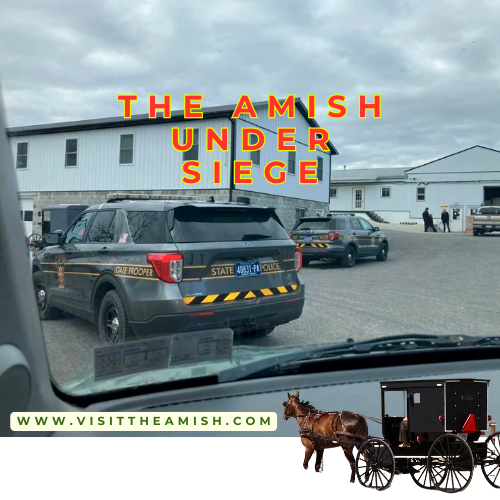The tension between the U.S. government and the Amish community has been escalating in recent years, highlighting a clash between traditional ways of life and modern regulations. This conflict is particularly evident in areas such as Pennsylvania, Ohio, New York, Virginia, and Wisconsin, where significant Amish populations reside[1].
One of the central figures in this tension is Amos Miller, an Amish farmer from Lancaster, Pennsylvania. Miller’s dairy farm was raided by police, bringing attention to the challenges faced by the Amish community in maintaining their traditional practices[1]. The raid on Miller’s farm is seen as part of a broader attack on the Amish way of life, particularly concerning issues such as raw milk production and small business operations.
The Amish community, known for their self-sufficiency and reluctance to engage with modern technology and government systems, are facing increasing pressure on multiple fronts:
- Food Production: The government’s stance on raw milk and traditional farming practices has put many Amish farmers at odds with regulatory bodies. The raid on Amos Miller’s farm is a prime example of this conflict[1].
- Healthcare: The Amish community’s approach to healthcare, including their stance on vaccinations, has come under scrutiny. Some observers note that the Amish community reportedly has a significantly lower rate of autism, which has fueled debates about modern medical practices[1].
- Education: While not explicitly mentioned in the search results, the Amish community’s approach to education often differs from state requirements, which has historically been a point of contention.
- Business Regulations: Small businesses, which are the backbone of many Amish communities, are reportedly under pressure from government regulations that may not align with traditional Amish practices[1].
In response to these pressures, there has been a notable shift in the Amish community’s political engagement. Traditionally, the Amish have abstained from participating in the political process. However, recent reports indicate that Amish people are now actively registering to vote[1]. This change is seen as significant, given their historical reluctance to engage in politics.

At a recent gun show in Harrisburg, Pennsylvania, observers noted a strong presence of Amish vendors and young community members. Remarkably, one out of every five voters registered at the event was Amish, indicating a growing political awareness within the community[1].
The tension has also sparked protests. An upcoming demonstration in support of Amos Miller in Lancaster is expected to draw around 1,000 people, showcasing the growing solidarity within and for the Amish community[1].
Critics of the government’s approach argue that law enforcement seems disproportionately focused on peaceful farmers while potentially overlooking more serious threats. They contend that targeting Amish farms for selling raw milk within their own communities is misguided, especially when compared to other pressing national security concerns[1].
As this situation unfolds, it’s clear that the tension between the U.S. government and the Amish community is not just a local issue but one that has implications for religious freedom, traditional lifestyles, and the balance between government regulation and individual rights. The increased political engagement of the Amish community may signal a new chapter in their relationship with the broader American society and government.
Citations:
[1] https://ppl-ai-file-upload.s3.amazonaws.com/web/direct-files/1202624/8fe05580-5676-4070-8faa-b899d8915e10/paste.txt

